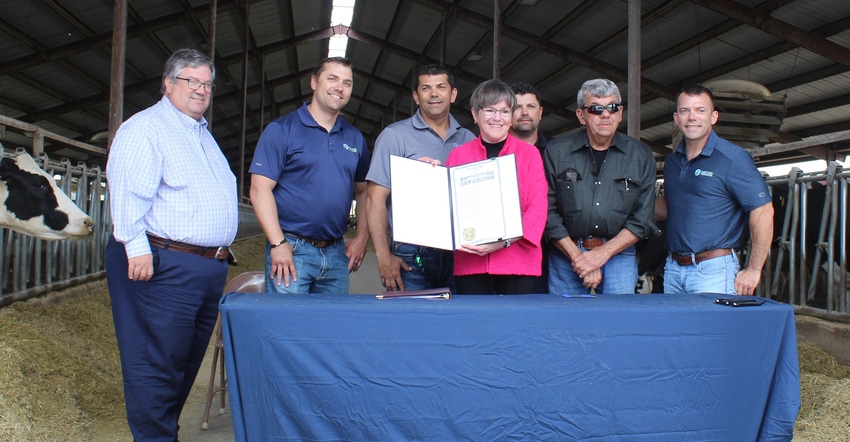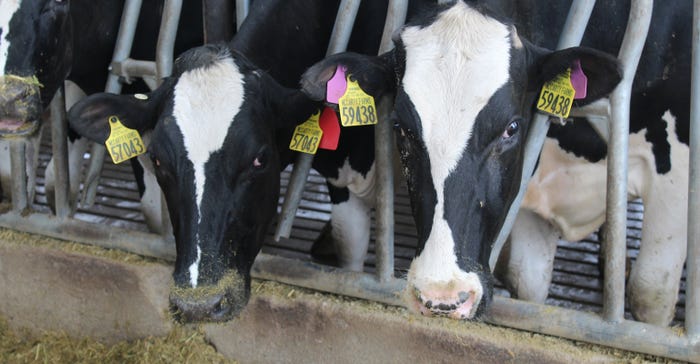
Kansas may be known for its waving wheat fields and its beef cattle industry. But in the past three decades, the state has started to grow its reputation for its expanding dairy cow herd and dairy production.
To celebrate this growth, Kansas Gov. Laura Kelly traveled out to McCarty Family Farms Dairy, Rexford, Kan., June 3, to sign the official proclamation that June is Kansas Dairy Month.
She signed the proclamation in one of the family’s dairy barns, flanked by members of the McCarty family and representatives from the Kansas agriculture community.
“Kansas has one of the fastest-growing dairy industries in the nation,” Kelly said. “Our dairy farmers feed the world and are essential to the overall success of our state’s economy. Dairy Month honors their hard work and contributions.”

According to the Governor’s Office and the Kansas Department of Agriculture, in less than 30 years the state’s dairy cow herd has doubled and milk production has nearly quadrupled. That’s due in part to large dairies relocating to the western half of the state, and the rise of the use of technology on the farm and in the dairy product manufacturing process. Today, Kansas has nearly 170,000 dairy cows and more than 210 dairy farms. In 2021, Kansas dairy farms produced more than $696 million in milk value alone.
Dairy expansion
Dave McCarty, chief financial officer of McCarty Family Farms, squired Kelly on a tour of the new construction the family is undertaking to expand their dairy near Rexford. The additional site will feature a carousel milking parlor and advancements in water reclamation — among other technological advancements — that will help the dairy continue to meet high standards for environmental sustainability.
“All completed, Phase 1 will be completed in December, and we’ll be milking 4,500 cows,” McCarty said. “Phase 2 will be done in 2023, and all combined, we’ll be milking 8,500 cows in the expansion.” The facility will use a water polishing process to further reclaim water from the production process, ultimately with the goal of being a net-zero user of water from the aquifer. There will also be an educational center, to tell the story of the family dairy for visitors and educate visitors about the area’s agricultural heritage.
Economic development
The expansion will also benefit the community of Rexford and surrounding towns like Colby and Oakley with the need for more workers and support businesses, he added.
Rexford, in Thomas County in the northwest corner of the state, has a population of 197 people, and agriculture is a key economic driver for the community. McCarty said he spoke with the governor about concerns the family has that can limit further agricultural expansion in the far west of the state as they toured the new construction.
“For this project in particular, power infrastructure was needed, explored and vetted prior to projects; and water, particularly in western Kansas is a big issue, as well as labor and housing, which are extremely challenging at this time,” McCarty said. “We know there’s no simple solution, but it sounds like the governor is allocating a lot more dollars towards housing in the long term. We’re working towards that, but it takes time.”
The dairies of today and those that are coming online in the future are relying more and more on robotics and other technology to ensure cow comfort, worker safety, environmental responsibility and the overall economic sustainability of the operation.
“One of the fascinating things I learned is about how the McCartys are putting in innovative technologies and approaches here to make it a really efficient and cost-effective operation,” Kelly said.
McCarty said having technology is great for the dairy, but it’s a struggle across the sector to find workers who can manage, repair and teach others how to use these new technologies.
This is why it’s important that Kansas’ state universities and community colleges expand those educational opportunities for young people, Kelly emphasized. She said that public-private partnerships with Kansas State University, Fort Hays State University and other institutions are beneficial to the state and to employers like McCarty Family Farms.
“I picked up a few things here, and I need to go back and talk to our Department of Commerce and others on ways we can be even more supportive and help the industry grow even bigger,” Kelly said.
McCarty Family Farms Dairy
McCarty Family Farms Dairy established the Rexford flagship location in 2000, relocating from Pennsylvania. They followed by adding another dairy in Bird City, Kan., in 2008; one in Scott City, Kan., in 2011; another in Beaver City, Neb., in 2014; and other expansions as well. In 2011, the dairy began an industry-first collaboration with Dannon, building a unique evaporative milk condensing plant on the Rexford location. This one-of-a-kind processing plant in North America uses an innovative process to reduce milk volume, reclaiming 45,000 gallons of water per day, which is then used for irrigation for the farm’s feed crops. This reduced milk volume also means McCarty Family Farms uses 75% fewer trucks to transport its milk to Danone NA, their processor. Along with reclaiming water used in the cooling process, the McCartys can recapture 158 million gallons of water for reuse.
The Kansas Governor’s Office and McCarty Family Farms contributed to this article.
About the Author(s)
You May Also Like






